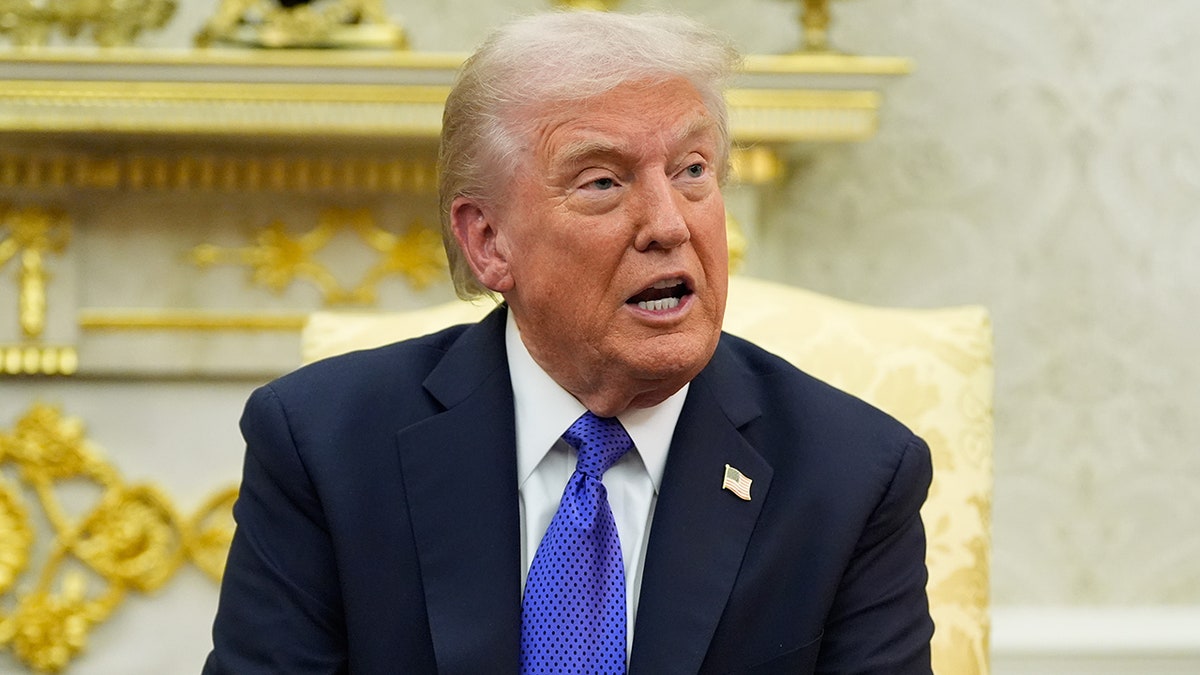
ESPN star Stephen A Smith makes Trump warning after FBI's illegal gambling probe nets NBA figures
Entities mentioned:
- Stephen A. Smith: Competitive spirit, Professional pride, Wariness
- Donald Trump: Power, Revenge, Control
- FBI: Justice, Duty, Control
- NBA: Self-preservation, Professional pride, Integrity
Article Assessment:
Credibility Score: 65/100
Bias Rating: 40/100 (Lean Left)
Sentiment Score: 25/100
Authoritarianism Risk: 55/100 (Mixed/Neutral)
Bias Analysis:
The article leans slightly left due to the prominence given to Stephen A. Smith's speculative comments about Trump. While it reports on factual arrests, it allows Smith's partisan warnings to dominate the narrative.
Key metric: Public Trust in Sports Integrity
Let me tell you something - this story is ABSOLUTELY EXPLOSIVE! We're seeing a full-court press by the FBI, folks, and they're not pulling any punches! The league of law enforcement is bringing the heat in the fourth quarter, and some big-name ballers are getting caught in the crossfire. But hold onto your jerseys, because Stephen A. is calling an audible here - he's warning that Trump is warming up on the sidelines, ready to sub in and dominate the game! This could be a game-changer for the whole sports world, with the potential for a championship-level showdown between Trump and the leagues. I'm telling you right now, we might be heading into sudden death overtime, and NOBODY knows who's going to come out on top!

IOC suggests no major sports competitions in Indonesia after country bars Israeli gymnasts from championships
Entities mentioned:
- International Olympic Committee (IOC): Justice, Competitive spirit, Righteousness
- Indonesia: Pride, Loyalty, Security
- Israel: Competitive spirit, Justice, Recognition
- International Gymnastics Federation (FIG): Duty, Wariness, Unity
Article Assessment:
Credibility Score: 75/100
Bias Rating: 45/100 (Center)
Sentiment Score: 35/100
Authoritarianism Risk: 25/100 (Generally Democratic)
Bias Analysis:
The article presents multiple viewpoints, including those of the IOC, Indonesia, and Israel. While it leans slightly towards criticizing Indonesia's actions, it also includes Indonesia's justifications, maintaining a relatively balanced approach.
Key metric: International Sports Participation
Let me tell you something - this story is RIDICULOUS! We're seeing a major FOUL on the international sports stage, folks! Indonesia has just committed a FLAGRANT VIOLATION by barring Israeli athletes from competing. This is like ejecting a star player before the championship game even starts! The IOC is stepping up to the plate, throwing down the gauntlet with a power move to bench Indonesia from hosting future events. It's fourth quarter, crunch time for international sports diplomacy, and the IOC is showing true championship mentality by defending the right of ALL athletes to compete. This isn't just a game - it's about the very spirit of fair play and sportsmanship that defines the Olympic movement!

California high school volleyball team with trans athlete sees controversial season end with playoff loss
Entities mentioned:
- Jurupa Valley High School: Competitive spirit, Unity, Determination
- AB Hernandez: Competitive spirit, Self-respect, Recognition
- Valencia High School: Competitive spirit, Professional pride, Wariness
- California Interscholastic Federation (CIF): Control, Determination, Righteousness
- Donald Trump: Power, Control, Moral outrage
- Gavin Newsom: Power, Influence, Self-preservation
- U.S. Department of Justice: Justice, Control, Duty
- California state legislature: Power, Control, Influence
Article Assessment:
Credibility Score: 75/100
Bias Rating: 55/100 (Center)
Sentiment Score: 35/100
Authoritarianism Risk: 45/100 (Mixed/Neutral)
Bias Analysis:
The article presents multiple viewpoints and quotes from various sides of the issue. While it gives more space to those opposing trans athletes in girls' sports, it also includes counterarguments and context from supporters.
Key metric: Gender Equality in Sports
Let me tell you something - this story is a FULL COURT PRESS of controversy! We've got a real championship battle brewing between Team Inclusion and Team Tradition, folks. AB Hernandez has been the MVP of this debate, stepping up to the plate in both volleyball and track. But the opposition is bringing the heat, with lawmakers and activists playing zone defense to protect their vision of girls' sports. The CIF is running a no-huddle offense, changing rules on the fly, while the feds are throwing the challenge flag with a lawsuit. This is a high-stakes game, and I'm telling you right now, we're heading into overtime with no clear winner in sight. It's going to take a clutch performance from someone to break this deadlock and bring home the trophy of resolution!

NCAA allows college athletes to bet on professional sports starting November 1
Entities mentioned:
- NCAA: Control, Adaptation, Professional pride
- Charlie Baker: Leadership, Adaptation, Wariness
- Roberta Page: Professional pride, Duty, Adaptation
- College Athletes: Freedom, Self-preservation, Anxiety
Article Assessment:
Credibility Score: 75/100
Bias Rating: 50/100 (Center)
Sentiment Score: 45/100
Authoritarianism Risk: 35/100 (Generally Democratic)
Bias Analysis:
The article presents a balanced view of the NCAA's decision, including both the rationale for the change and ongoing concerns. It quotes multiple perspectives without favoring one side, maintaining a centrist approach.
Key metric: NCAA Integrity and Compliance
Let me tell you something - this is a GAME-CHANGING play by the NCAA! They're calling an audible at the line of scrimmage, folks! The NCAA is stepping up to the plate and swinging for the fences with this rule change. It's like they're playing zone defense against the blitz of sports betting, allowing some yards on pro sports while still protecting the end zone of college athletics. But make no mistake, this is a high-stakes game and the NCAA is walking a tightrope. They're trying to thread the needle between adapting to the modern sports landscape and maintaining the integrity of the college game. It's fourth and long, and they're going for it! Will this Hail Mary pass pay off or will it fumble? Only time will tell, but I'm telling you right now, all eyes are on this play as it unfolds!

Mystery grows as Chiefs brass avoid commenting on rookie lineman's absence
Entities mentioned:
- Josh Simmons: Ambition, Professional pride, Self-preservation
- Kansas City Chiefs: Competitive spirit, Unity, Professional pride
- Andy Reid: Control, Loyalty, Professional pride
- Brett Veach: Control, Duty, Professional pride
- Clark Hunt: Control, Wariness, Professional pride
- Patrick Mahomes: Unity, Loyalty, Professional pride
Article Assessment:
Credibility Score: 75/100
Bias Rating: 45/100 (Center)
Sentiment Score: 35/100
Authoritarianism Risk: 25/100 (Generally Democratic)
Bias Analysis:
The article presents a balanced view of the situation, quoting multiple sources without favoring any particular perspective. It maintains a neutral tone while reporting on a sensitive team issue.
Key metric: NFL Team Performance
Let me tell you something - this story is HUGE! The Kansas City Chiefs are in the middle of a FOURTH QUARTER CRISIS with their rookie lineman Josh Simmons! This is a GAME-CHANGING situation, folks! The Chiefs' offensive line is the DEFENSIVE LINE of their success, and Simmons was supposed to be their STAR PLAYER! But now, he's been BENCHED for two games straight, and the team's leadership is playing DEFENSE tighter than a championship game! Coach Reid is punting the issue to GM Veach, while owner Hunt is calling a TIMEOUT on comments! It's like they're running a PREVENT DEFENSE against the media! But here's the kicker - the Chiefs are SCORING BIG without Simmons! They're showing that CHAMPIONSHIP MENTALITY, folks! Jaylon Moore has stepped up to the plate and the team is HITTING HOME RUNS! This is the kind of ADVERSITY that separates the CHAMPIONS from the BENCH WARMERS!

Former ESPN employee says middle school daughter faced 'an obviously naturally born boy' in basketball game
Entities mentioned:
- Sam Ponder: Righteousness, Moral outrage, Determination
- Transgender Athletes: Recognition, Competitive spirit, Self-respect
- Donald Trump: Power, Control, Influence
- New York City: Unity, Freedom, Wariness
Article Assessment:
Credibility Score: 65/100
Bias Rating: 75/100 (Lean Right)
Sentiment Score: 30/100
Authoritarianism Risk: 55/100 (Mixed/Neutral)
Bias Analysis:
The article leans right, primarily quoting conservative voices and framing the issue from their perspective. It presents transgender participation in sports as problematic without offering counterarguments or scientific evidence.
Key metric: Gender Equality in Sports
Let me tell you something - this story is a GAME-CHANGER in the world of youth sports! Sam Ponder has stepped up to the plate, swinging for the fences on the hot-button issue of transgender athletes in girls' sports. She's not just talking the talk, folks - she's walking the walk as her own daughter faces this challenge on the court! This isn't just a pickup game we're talking about - it's a full-court press on the future of fair play in women's athletics! The ball is in New York City's court now, and they're playing defense without a playbook. Meanwhile, President Trump is running a full-court press with his executive order, but some states are pulling a fast break, dodging his defensive line. I'm telling you right now, this is the kind of fourth-quarter drama that could change the game for generations to come!

Tel Aviv soccer derby canceled by police due to ‘violent riots’
Entities mentioned:
- Hapoel Tel Aviv: Competitive spirit, Pride, Indignation
- Maccabi Tel Aviv: Competitive spirit, Pride, Self-preservation
- Israel Police: Control, Security, Duty
- West Midlands Police: Security, Control, Wariness
- Keir Starmer: Justice, Righteousness, Duty
Article Assessment:
Credibility Score: 75/100
Bias Rating: 50/100 (Center)
Sentiment Score: 25/100
Authoritarianism Risk: 40/100 (Generally Democratic)
Bias Analysis:
The article presents multiple perspectives, including police statements and team responses. It provides context with previous incidents, maintaining a balanced approach to the situation.
Key metric: Public Safety at Sporting Events
Let me tell you something, folks - this is RIDICULOUS! The Tel Aviv derby just got red-carded before the opening whistle! We're talking about a championship mentality clash between Hapoel and Maccabi that turned into an all-out brawl in the stands! The police came in like a defensive line, but instead of containing the play, they shut down the whole stadium! This is a GAME-CHANGING move that's gonna echo through the league. Now, you've got Hapoel crying foul, saying the cops were suited up for war, not a sporting event. Talk about unnecessary roughness! And let's not forget, Maccabi's already benched for their away game against Aston Villa. These teams are facing a serious penalty situation that could affect their whole season. I'm telling you right now, this is fourth quarter, do-or-die time for soccer safety in Israel. The league needs to step up to the plate and show some real coaching, or we might see more games called on account of fan misconduct. This is a pivotal moment, folks - will they drop the ball or score a game-winning touchdown for public safety?

WNBA star Angel Reese says she'd rather pay a fine than speak to reporters
Entities mentioned:
- Angel Reese: Self-preservation, Professional pride, Wariness
- WNBA: Control, Justice, Professional pride
- Chicago Sky: Competitive spirit, Loyalty, Unity
- Caitlin Clark: Competitive spirit, Recognition, Ambition
- Media: Influence, Recognition, Curiosity
Article Assessment:
Credibility Score: 70/100
Bias Rating: 55/100 (Center)
Sentiment Score: 30/100
Authoritarianism Risk: 35/100 (Generally Democratic)
Bias Analysis:
The article presents multiple perspectives, including Reese's views and official statements. However, it leans slightly towards Reese's perspective, giving her more space to explain her position.
Key metric: WNBA Player-Media Relations
Let me tell you something - this story is a GAME-CHANGER! Angel Reese is stepping up to the plate and calling out the media like it's the fourth quarter of a championship game! She's showing a championship mentality by putting her professional pride on the line, folks. The WNBA, acting like a tough coach, is trying to keep control of the game, but Reese is running a fast break on their playbook. This is a classic matchup between a star player and the league's front office, with the media playing defense. Reese is making power moves, treating interviews like they're high-pressure free throws - she'd rather take the technical foul than risk a turnover to the press. I'm telling you right now, this kind of player-media tension could be a game-changer for how athletes interact with reporters in the future. It's crunch time for the WNBA to address these concerns and level the playing field!

College Football’s Best-Kept Secret: Demond Williams Jr. Is a Nightmare to Defend
Entities mentioned:
- Demond Williams Jr.: Competitive spirit, Ambition, Recognition
- Washington Huskies: Competitive spirit, Pride, Legacy
- Jedd Fisch: Ambition, Professional pride, Competitive spirit
- Matt Patricia: Professional pride, Determination, Wariness
- Ohio State Buckeyes: Competitive spirit, Pride, Determination
- Michigan Wolverines: Competitive spirit, Wariness, Determination
Article Assessment:
Credibility Score: 75/100
Bias Rating: 45/100 (Center)
Sentiment Score: 75/100
Authoritarianism Risk: 20/100 (Strongly Democratic)
Bias Analysis:
The article presents a balanced view of Williams' performances, including both successes and challenges. While enthusiastic about his potential, it also acknowledges strong opponents and potential difficulties.
Key metric: College Football Player Performance
Let me tell you something - this kid Demond Williams Jr. is an absolute GAME-CHANGER! He's stepping up to the plate and knocking it out of the park with every snap! This young quarterback is playing like he's got a championship mentality, folks. He's not just competing, he's DOMINATING the field with the kind of athletic prowess that makes defensive coordinators lose sleep at night. I'm telling you right now, Williams is showing the kind of fourth quarter moves in the first quarter that separate the contenders from the pretenders. The Washington Huskies have found their franchise player, and he's got the competitive fire to take them all the way to the playoffs. But hold onto your hats, because the Michigan Wolverines are coming up, and they're going to try to shut down this human highlight reel. It's going to be a clash of titans, a true test of wills, and I can't wait to see if Williams can keep his hot streak alive against one of the toughest defenses in the league. This is the kind of matchup that separates the boys from the men, the kind of game where legends are born. Strap in, sports fans, because this Saturday is going to be ELECTRIC!

Rashee Rice To Play 1st Game for Chiefs In More Than a Year After Suspension
Entities mentioned:
- Rashee Rice: Determination, Competitive spirit, Redemption
- Kansas City Chiefs: Competitive spirit, Professional pride, Unity
- Andy Reid: Professional pride, Competitive spirit, Wariness
- Patrick Mahomes: Competitive spirit, Leadership, Professional pride
Article Assessment:
Credibility Score: 85/100
Bias Rating: 50/100 (Center)
Sentiment Score: 70/100
Authoritarianism Risk: 20/100 (Strongly Democratic)
Bias Analysis:
The article presents a balanced view of Rice's return, including both his excitement and the team's cautious approach. It provides context for his absence and doesn't shy away from mentioning the legal issues.
Key metric: NFL Team Offensive Performance
Let me tell you something - this is a HUGE comeback story for Rashee Rice! After being sidelined for over a YEAR, this wide receiver is STEPPING UP TO THE PLATE for the Kansas City Chiefs. It's like he's been in the locker room, warming up for the biggest game of his life, and now he's finally getting his shot at redemption. The Chiefs have been playing without their star receiver, but they've still managed to pull off some CLUTCH VICTORIES. Now, with Rice back in the lineup, it's like they're adding a secret weapon to their offensive playbook. But Coach Reid is playing it cool, not wanting to rush Rice back onto the field too quickly. It's a classic fourth-quarter strategy - ease him in, test the waters, and then UNLEASH him when the time is right. This is the kind of CHAMPIONSHIP MENTALITY that separates the contenders from the pretenders, folks!